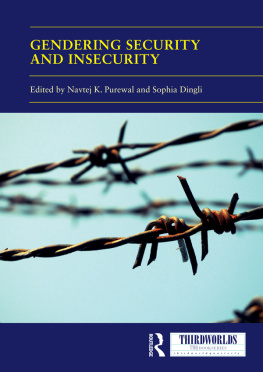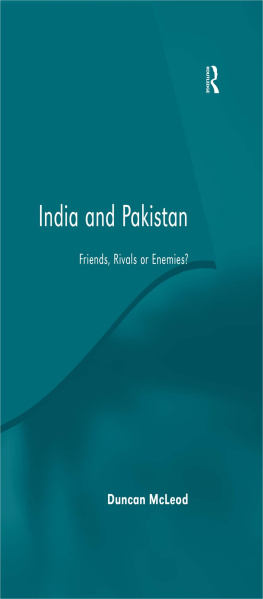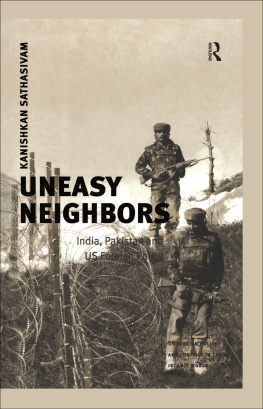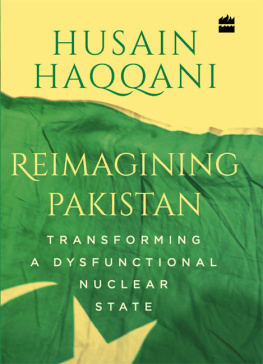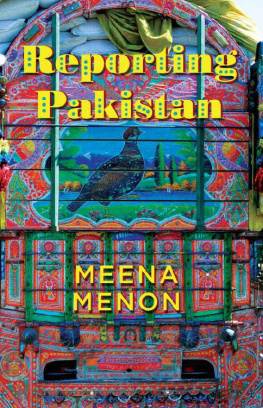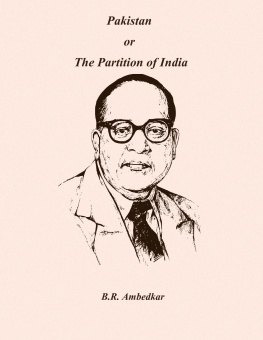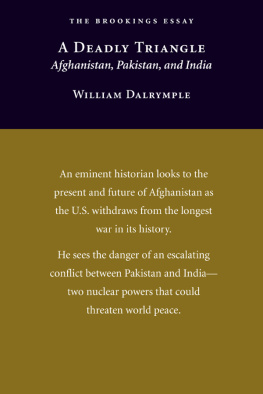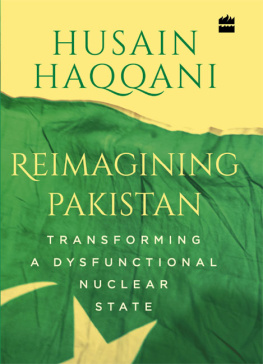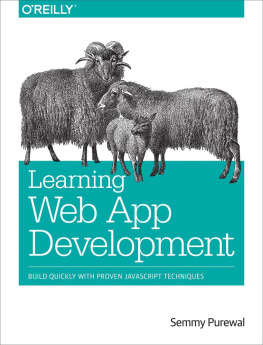Beyond Religion in India and Pakistan
Bloomsbury Studies in Religion, Gender, and Sexuality
Series Editors: Dawn Llewellyn, San Hawthorne and Sonya Sharma
This interdisciplinary series explores the intersections of religions, genders, and sexualities. It promotes the dynamic connections between gender and sexuality across a diverse range of religious and spiritual lives, cultures, histories, and geographical locations, as well as contemporary discourses around secularism and non-religion. The series publishes cutting-edge research that considers religious experiences, communities, institutions, and discourses in global and transnational contexts, and examines the fluid and intersecting features of identity and social positioning.
Using theoretical and methodological approaches from inter/transdisciplinary perspectives, Bloomsbury Studies in Religion, Gender, and Sexuality addresses the neglect of religious studies perspectives in gender, queer, and feminist studies, and offers a space in which gender-critical approaches to religions engage with questions of intersectionality, particularly with respect to critical race, disability, post-colonial and decolonial theories.
There are many people who have been a part of the making of this book, especially as it has been over ten years in the making. At the forefront are all of the people who spoke with us at the shrines and sites of the research, as well as those who live in the localities or work at the universities near the research sites. Our two bases during the field research, Lahore and Chandigarh, became enabling, fortifying and enriching spaces for us to make sense of our field research. Our insights were shaped by their insights.
We were fortunate to have people around us who understood our project and supported us in our endeavour to engage with the underlying dynamics of a society overtly shaped by nationalism and religious identity but intrinsically connected: Ishaque Chaudhary, for his unrelenting and cutting critique of the overarching discourses of religion and nationalism; Najm Hosain Syed and late Bibi Samina for creating the space of Sangat in Lahore for the appreciation and distillation of Punjabs rich poetic-philosophical heritage; and B.S. Rattan and Rama Rattan for providing a base in Chandigarh from which we could develop our fieldwork. We are indebted to Iqbal Kaiser, whose lifelong commitment to sustaining the continuities across the border despite the ruptures of nationalism has provided much inspiration for this book.
We are grateful to Ursula Sharma, who accompanied us to east and west Punjab and provided us with much clarifying advice during an otherwise bewildering ethnographic experience in helping us to make sense of our complex field. Her assurances and uniquely rich insights were invaluable to us in the depths of the field. For conversations, facilitations and critical engagement with the research at its various stages to make this text possible, we are indebted to colleagues at Lahore University of Management Sciences (LUMS) Ali Khan, Furrukh Khan and Turab Hussain; Government College Lahore Tahir Kamran, Umber Ibad and Tahir Jamil; Chitrkar Shahid Mirza; Punjabi University, Patiala H.S. Bhatti and Gurpreet S. Lehal; Panjab University, Chandigarh Ishwar Dayal Gaur, Surinder Singh, Sherry Sabbarwal and Ronki Ram; Guru Nanak National College for Women Principal Mrs Gurmeet K. Atwal. To our research assistants in their various capacities with their multiple skills in the research: Muhammad Abbas for fieldwork assistance in west Punjab; Hani Taha for assisting with various aspects of coding our material in west Punjab; Manpreet K. Gill who assisted with processing and coding the survey data; Gagun Chhina for helping with organizing the visual data; Irshad for acting beyond the call of duty of a driver by being a companion and advisor during extended shrine visits across west Punjab; and Kirpal Singh, whose understanding of the field was invaluable to our analysis of the fieldwork which he continued on an ongoing level in east Punjab. We are grateful to the team of students from D.A.V. College in Amritsar for the surveys and interviews carried out in Amritsar and Himachal.
To other colleagues/friends for their comradery over the years which was essential as the ideas percolated across sites, borders, debates and contexts: Ajay Bhardwaj, Darshan S. Tatla, Mandeep Kaur, Jasdeep Kaur, Nida Kirmani, Shams Rehman, Ayesha Siddiqa, Geoffrey Samuel and Santi Rozario. The generosity of friends in Lahore made our fieldwork in west Punjab not only possible, but also a memorable and fond time. In particular, we thank Mariyam and Ali Khan, Rabeea and Furrukh Khan, and Sara Zaidi and family. We are grateful to relatives who made the fieldwork in east Punjab a continuum of the west Punjab fieldwork. Special thanks to Mano Mami ji Bedi, Vicky and Hema Bedi, K.P. Singh, Rana, Manak and Raunak for their kind hospitality and interested questions about what it was we were actually doing. We also thank Jagmohan Singh Kalra and Honey, Daljit Bhua, Nimmi, Sahil, Henna, Balbir Bhabi, Timmy, Keenu and all the other cousins and branches of family who supported us not only during the core fieldwork time but also during our numerous trips.
On another level of inspiration are those who passed away over the span of the research: Ustad Hafeez Khan Sahib, whose wisdom and knowledge of Punjabs musical heritage we were fortunate to behold; Bhai Ghulam Muhammad Chand who was the last of a generation who embodied the spirit of the resilience of the shared philosophical-poetic tradition of Punjab; Bibi Samina who in many ways introduced these learned souls to us; Bilal Ahmed for a Diwali in Lahore in 2008 which implemented border crossing; Gurdeep Bhua whose joy at calling us the Lahore waale and whose own childhood memories of Lyallpur, a city she left in 1947, continue to coalesce her extended family; and finally, Surjit Singh Kalra whose passion and spark for Punjabi lit the flame for this book to come into fruition. Their memories are each bound in the pages of this book.
Our two daughters, Eesher and Nuvpreet, embarked on this journey with us through multiple uprootings, border crossings and experiences. This project, which began with them at the ages of four and eight, grew with them.
Our families span a network that links Punjab to the United Kingdom and the United States, a diasporic reckoning that informs much of the bordering works and our alertness to gender and caste that is so central to the intellectual project presented here: Balbir Kaur Kalra, Amarjit Kaur Purewal, Tarlok Singh Purewal, as migrants and our elders; Paul and Andi, Jasi and Vivian, the first generation; Kiran, Arjan, Gurtej and Gursymrun, the next and future generations.
Research for this book was generously supported by a large grant held between 2008 and 2010 from the Religion and Society programme which was jointly funded by the Economic and Social Research Council (ESRC) and the Arts and Humanities Research Council (AHRC) in the UK. Without this funding, the ideas behind this project could not have been pursued empirically, and this book would have remained in the realm of conversations and ideas without being collated or written down.
We wish to express our gratitude to the Bloomsbury Academic editorial team for their patience and professionalism throughout the publication process and to the Bloomsbury Studies in Religion, Gender, and Sexuality series editors, in particular San Hawthorne for her close sixth-sense reading of, and comments on, the text. We thank Jennifer Ung Loh for editing and producing the text and Gopinath Anbalagan at Integra Software Services for the care and attention given to the copyediting and typesetting of the book in its final form. Finally, we are thankful to the anonymous reviewers of the manuscript whose knowledgeable engagement with our work helped to refine the book into what is presented here.



